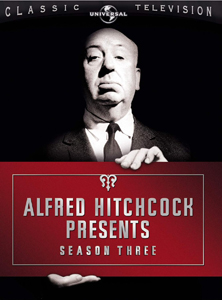Alfred Hitchcock’s three episodes in “Alfred Hitchcock Presents” Season 3 (1957-58, CBS) feature an all-time classic of dark humor, a compelling back-and-forth between two good actors, and a tasty bit of grim irony. All told, a nice little package.
The latter two are penned by Roald Dahl, also a famous children’s book writer, from his own short stories. He pioneered the anthology format of quick-hitting dark tales in “Way Out” (1961); it wasn’t a hit, but it paved the way for “The Twilight Zone” and “AHP.” Apparently not bitter about his bad luck, he wrote six episodes of “AHP,” starting with one that’s on pretty much all top 10 lists of “AHP” episodes.
(SPOILERS FOLLOW.)
In like a lamb, out like a lion (Spoilers)
“Lamb to the Slaughter” (28) earns its status as a classic, despite the fact that it’s the most simple howcatchem imaginable. A husband comes home from work to his doting wife (Barbara Bel Geddes) and announces he is going to divorce her for another woman. In a sort of fugue state, she murders him with a frozen leg of lamb.

“Alfred Hitchcock Presents” Season 3 (1957-58)
CBS; 39 episodes (This post reviews the three Hitchcock-directed episodes.)
Episodes: “The Perfect Crime” (3), “Lamb to the Slaughter” (28), “Dip in the Pool” (35)
Director: Alfred Hitchcock
Writers: Stirling Silliphant (3, teleplay), Ben Ray Redman (3, story), Roald Dahl (28, 35)
Stars: Vincent Price, Barbara Bel Geddes, Keenan Wynn
The detectives and medical examiner aren’t idiots; they soon realize the husband was a victim of a rounded club, and they think the weapon must still be on the premises. The final shot is deliciously (pun intended) hilarious, as no less than six cops take a dinner break to devour the lamb – the wife didn’t want it to go to waste – and one surmises that the weapon has gotta be “right under our noses.”
The close-up of Bel Geddes’ laugh at the end perhaps inspired the end of “Psycho.” And when watched today, we feel sympathy for the wife both because we share her shock at the divorce demand and because we like Bel Geddes from the later film “Vertigo.”
Because of network rules similar to what the Hays Code did for cinema, murderers aren’t allowed to get off, so “AHP” cleverly had many stories essentially end twice. There’s the actual adaptation (where the killer gets away with it) plus the coda spoken by Hitchcock (where we learn they didn’t get away with it after all). This often served as a bonus wink of dark humor, and here it doesn’t impact our sick enjoyment of the wife getting away with it – at least originally.
Hitchcock’s other two episodes (Spoilers)
“The Perfect Crime” (3), written by Stirling Silliphant from a story by Ben Ray Redman, does something similar. A prosecutor (Vincent Price, one of cinema’s most distinct voices) brags to a defense lawyer (James Gregory) over drinks in his living room how he followed the evidence and put away a murderer.

The defense lawyer happens to know the people in the case, and knows the executed man was innocent, and someone else on the scene was the killer. The pleasure here is in watching the smug look gradually depart Price’s face. The tale has a supremely dark ending, so we’re glad when Hitch undercuts it in the coda because we don’t like this guy getting away with it.
“Dip in the Pool” (35), written by Dahl, doesn’t feature a murder. It’s a fable about a gambling addict (Keenan Wynn) ruining his life by overthinking combined with ill-timed bad luck. Too slow-building to be great, the cruise-ship-based episode nonetheless lingers with a viewer because of the man’s sad situation. Because he dies at the end due to wrongly counting on being rescued if he jumps overboard, Hitch’s coda feels like a twisting of the knife.
Hitchcock doesn’t do anything particularly showy as a director in Season 3 (credit to how he lingers on the cops devouring the lamb, though). But the acting is top-shelf, and viewed together we must grapple with the irony wherein we meet three villains (or semi-villains), and find ourselves rooting for some but not others based on their circumstances and personalities. As such, “AHP” reminds us that we – like the show – exist in a world of inconsistent morality; perhaps the best response is to laugh.
RFMC’s Alfred Hitchcock series reviews works by the Master of Suspense, plus remakes and source material. Click here to visit our Hitchcock Zone.

